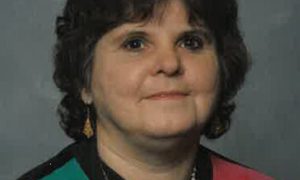WESTFIELD –One of the items considered Wednesday at the first meeting of the all-new Finance Committee under At-large Councilor Daniel Allie, chair, and members Ward 3 Councilor Andrew K. Surprise and At-large Councilor Matthew Emmershy, was the establishment of a special purpose stabilization fund for road and sidewalk maintenance and repair, as proposed by Surprise and At-large Councilor Dave Flaherty in a motion at the Jan. 7 City Council meeting.
Surprise read a memo from the state Division of Local Services regarding changes through the Municipal Modernization Act that allows cities and towns to establish special purpose stabilization funds and dedicate specific reference sources to those funds. The memo states the reason for doing this would be to dedicate specific funds for vehicles, road repairs, capital expenses and buildings. He said the state actually encourages this.

Ward 3 Councilor Andrew K. Surprise (WNG File Photo)
Surprise said they were trying to establish a fund, to use the Local Meals Tax and Room Occupancy Tax the City Council voted for in June of 2016 for roads and sidewalks maintenance and repair.
“To be frank, the Mayor did promise to use that money for those purposes, and now it’s in the general fund,” Surprise said.
Emmershy asked David Billips, Director of the Department of Public Works if what was proposed would help him to do the roads, as a funding source to improve the roads. “Of course, more money is always good. I’ve got big plans,” he said, adding, “I don’t know how much money is going to be generated.”
At-Large Councilor Dave Flaherty, who was also present although no longer on the Finance Committee responded that the Meals Tax is generating about $128,000 a quarter.

At-large City Councilor David Flaherty
Flaherty said his concern from the beginning was that the money be used for roads and not for the general fund. “It passed by one vote, and the Mayor stood right there and guaranteed, he promised that the money would be used for roads. It just hasn’t happened,” Flaherty said. “Now it’s in the general fund. This allows us to dedicate it to the stabilization fund, and it can’t come out of the stabilization fund without nine votes,” he added.
Flaherty also said the fund would still allow the flexibility for funds to be used for other emergencies, but would require nine votes. He said the other question is, can the Council earmark the funds, and who can authorize the earmarking of the funds. He said the new Modernization Act makes it clear to him that the legislative body is the one that puts the orders out there, and initiates the order. He said the Mayor has to sign it, or he can veto it and the Council can vote on it.
Surprise said he spoke to an attorney with the Division of Local Services, Municipal Finance Department who said there was nothing wrong with the City Council doing this.
Allie said the Mayor working with the DPW would be deciding on the projects to be funded. Flaherty said to accept the structure and to earmark the funds are all legislative branch actions.
“So he would be able to use this for buys, for highway department, for equipment, for materials – he’s not going to be tied up on the use of this?” asked Emmershy.
“Only the Mayor can initiate spending,” Allie said. “Have either of you spoken to the Mayor, or plan to,” he asked Surprise and Flaherty.
“We’re trying to solve a problem here. The problem is there was a promise made for these taxes, and it’s not being fulfilled. We’re trying to find a way around that, to use it for what it was intended for,” Flaherty said.

At-Large City Councilor Dan Allie
“I’m sure the Mayor’s going to want to comment on this,” Allie said.
Surprise asked City Attorney Susan Phillips if Legal had an opinion. Phillips said they hadn’t been asked for an opinion, but they clearly saw it on the agenda, and the department will be looking at it this week. “I’ll be happy to share our thoughts with you when we do,” Phillips said.
Ward 2 Councilor Ralph J. Figy, who chairs the Legislative & Ordinance Committee, came forward with some concerns.
“If it starts, where does it stop? Now we picked out roads and sidewalks, what’s to prohibit the Council from taking over the whole budget, the whole budgetary process and just eliminating the Mayor,” Figy said, adding that he is a strict interpreter of the Constitution and believes in the separation of powers.

Ward Two Councilor Ralph J. Figy
“I do believe it’s the Mayor’s job to do the budget. It’s his job to put his foot where his mouth is. It’s his job to determine where the monies that come into this city are spent, and I think that this is an attempt by the legislative body to take over that role, and I’m not a fan or a believer in that. We all have our rules and our regulations and our jobs to do under the separation of powers,” Figy continued.
“My biggest concern is okay, we do sidewalks and roads, what’s to stop us from doing something else, and something else, and something else; to the point where all of a sudden there’s no need for a Mayor to do a budget. I think we have enough to do in the City Council without taking on these added responsibilities,” Figy said.
“The state gives us this ability. Many cities and towns have done this,” Surprise said, adding that the state has been encouraging the practice since the laws changed in February, 2016. “We not taking power away from the Mayor,” he added.
Flaherty said this is considered a “recommended best practice” by the state. He gave the example of putting $50,000 a year in a fund that allows the city to buy a fire truck in 20 years. “It’s a good financial management practice,” Flaherty said.

City Council At-Large candidate Matt Emmershy.
“That is allowing us to set up a separate savings account,” Emmershy asked for clarification.
“You’re proposing right now that it would be for roads and sidewalks,” Allie also asked.
“For this one; yes. There’s going to be more,” Flaherty said.
Emmershy asked if there were any local cities and towns that have done this. Surprise said the DOR went to Southampton and recommended that they create several stabilization funds.
Flaherty said another example that might be in the pipeline would be for marijuana money, dedicated to a fund that helps addicts.
“We’ve built that into the agreement,” Phillips said, noting that a minimum additional of $58,000 will go to the Board of Health, and another additional sum to the Police Department.
“There are things like that in the realm of possibility here, that I think we should be looking at,” Flaherty said.

At-Large City Councilor John J. Beltrandi III
Council President John J. Beltrandi came forward and noted that there hasn’t been any discussion with the Mayor directly about the creation of the fund. “It would be a good idea to have a conversation with the Mayor about this, to see what works. It’s communication,” Beltrandi said.
“We’re a separate body of government,” Flaherty said.
“We’re taking on a lot of responsibilities for the other side. We still need to be able to work together,” Beltrandi said.
“We don’t have to agree with him, and we don’t have to collaborate with him,” Flaherty said.
“My suggestion would be to have the discussion before we just push forward,” Beltrandi said.
Emmershy asked Billips if he knew what the Mayor will fund for the DPW from the Meals Tax this spring. Billips said they wouldn’t know how much it would be until they received it. “Keep in mind, for snow and ice last year, we budgeted $400,000 and spent $1.6 million,” Billips said.
“If it isn’t going to the roads, we can vote to rescind the Meals Tax,” Flaherty said, adding that he was prepared to do that.
“Let’s try to work with the Mayor on this. Let’s see what we can work to get,” Allie said. He then made a motion that passed to have the matter remain in committee.








